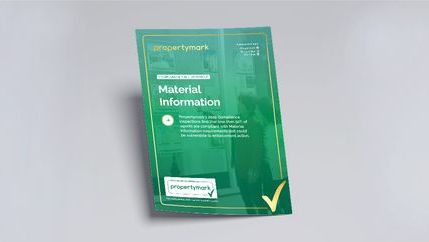
OFSI, part of HM Treasury, oversees compliance with the UK’s financial sanctions regime, which applies to estate and letting agents as part of national efforts to combat economic crime.
Propertymark continues to work closely with HM Treasury, OFSI, and HMRC to help members understand their responsibilities and strengthen the UK property market’s resilience against financial crime.
Supporting proportionate enforcement
Penalties should be strong enough to deter those who knowingly breach sanctions but balanced with leniency and support for those who make honest mistakes or act in good faith. OFSI must:
- Prioritise penalties for deliberate breaches while reducing penalties for unintentional non-compliance to encourage openness and self-reporting.
- Recognise and reward post-breach good behaviour, including training or procedural improvements, through reduced penalties and support.
- Incentivise cooperation between OFSI and agents to help identify sanctioned individuals and understand how they circumvent systems.
- Ensure penalties outweigh any financial benefit gained from dealing with designated persons.
Encouraging self-reporting
The proposal to reduce voluntary disclosure discounts from up to 50% to 30% could discourage firms from coming forward. Instead, we recommend maintaining a 30% discount for voluntary disclosure, rising to 50% for full cooperation, and reducing it where firms frustrate investigations.
Sector-specific guidance must also be provided to help property businesses understand what cooperation with OFSI entails in practice.
Settlement and early engagement schemes
We support the introduction of both Settlement and Early Account Schemes, which would allow firms that have unintentionally breached sanctions to settle cases quickly in exchange for reduced penalties and educational support.
Participation in such schemes should come with tailored advice from OFSI to prevent reoffending, and full cooperation under the Early Account Scheme could, in some cases, result in the removal of financial penalties altogether.
Penalty reform and clarity
Where deliberate misconduct is established, we are in favour of raising the maximum penalty for the most serious breaches to £2 million and increasing fines to 100% of the value of the transaction when necessary, ensuring no one profits from dealing with sanctioned persons.
We also advocate fixed penalties rather than indicative ranges, to bring consistency and reduce administrative burdens.
Aligning sanctions with wider economic crime measures
Our response builds on the recommendations set out in our position paper, Reducing Economic Crime in the Property Sector, where we urged the UK Government to ensure that financial sanctions and anti-money laundering regimes are aligned, proportionate, and supported by clear guidance and training.
The property sector plays a key role in preventing illicit finance and is already subject to multiple compliance requirements under the Money Laundering Regulations (MLRs). However, inconsistencies between AML supervision and the enforcement of financial sanctions create unnecessary complexity for agents and increase the risk of inadvertent non-compliance. We have therefore called for closer coordination between HM Treasury, OFSI, HMRC, and the National Crime Agency to deliver a unified approach that reduces duplication and ensures businesses receive consistent messaging about their obligations.
Support for property agents
Propertymark is dedicated to supporting its members in achieving and maintaining compliance, and we have a wealth of resources and comprehensive training, to guide agents through best practices and ensure knowledge and tools to meet AML obligations. We aim to empower our members to navigate AML regulations confidently.
Our Compliance audit support service combines a friendly audit service with 1:1 advice, ensuring your agency can navigate complex government regulations, avoid expensive fines that cost tens of thousands of pounds, and protect you against uncertainty.







